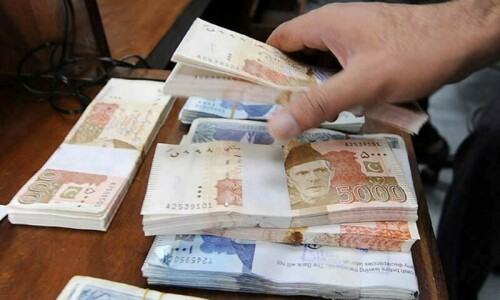The World Bank said in a report released last week that the poverty rate in Pakistan stood at 40.5 per cent. That means about 100 million out of 240m plus Pakistanis are living on less than $3.65 per day as per the purchasing power parity of 2017. In simple words, 100m Pakistanis cannot use their daily income to buy today with what they could have bought with $3.65 in 2017. Hence, they are considered poor.
At the current exchange rate, $3.65 roughly equals Rs1,000. One can only imagine what goods or services a Pakistani citizen could buy with this amount in a day, or what kind of life an individual earning Rs30,000 per month can live in today’s Pakistan.
Pakistan has a long way to go to reduce this huge incidence of poverty. Social safety nets, like the Benazir Income Support Programme, are helpful in taking care of extremely poor people whose daily income is currently below $2.15, or a little over 600 Pakistani rupees. But, reducing overall poverty or enabling people to earn a daily income higher than $3.65 isn’t possible without creating more jobs and without ensuring sustained economic growth.
Since the industrial sector has suffered the most in the past two fiscal years, there is an urgent need to revive the sector with the objective of creating more jobs without compromising on labour productivity and enabling export-oriented industries to export more at a higher per unit price.
Even within the small pie of private sector business financing, the share of smaller provinces is disproportionally low
Besides, easing import restrictions has helped export industries raise their output. In FY23 and FY24, Pakistan’s industrial sector (including construction) shrank 3.7pc and 1.2pc, respectively, according to the latest World Bank estimates.
The industrial sector has suffered for many reasons, including economic instability and policy inconsistency, organised and street crimes, energy crises and infrastructure bottlenecks, lack of investment and technological advancement and low levels of ease of doing business, productivity and efficiency. These issues are still prevalent.
Militancy and terrorism, meanwhile, have always impeded the creation of new industrial/export zones and operations of the existing ones, particularly in Balochistan and Khyber Pakhtunkhwa. This problem not only exists, but its scope and intensity have lately increased.
Prior governments have addressed structural problems with remedies more suited to cyclical or temporary issues. Policy inconsistencies of one regime are exposed — sometimes partly corrected — by another regime, but the same regime exposes many more inconsistent policies only to be exposed and partly corrected by the next one. And this vicious cycle goes on and on.
The roots of policy inconsistencies can easily be traced into our governance system at any given time — democracy with less interference of the establishment or the openly accepted and practised hybrid regime — inter-provincial disharmony or lack of harmony between smaller provinces and the federal government. Unless these root causes are addressed, no policy for industrial revival can yield the desired results.
By June 2023, commercial banks’ advances to private businesses were Rs2.97tr in Punjab, Rs2.94tr in Sindh while only Rs118.7bn in KP, and Rs9.4bn in Balochistan
For example, the de-industrialisation that Karachi has witnessed in the past two decades is never openly admitted and never diagnosed correctly, perhaps for fears that it would open a Pandora’s box of political mistakes and injustices.
Similarly, actual reasons for the massive lack of development in Balochistan are never openly debated, let alone diagnosed correctly and remedied, perhaps for fears that such an exercise at a given period of history would compound the overall Balochistan issue.
Nor do we see any meaningful attempt to admit what political mistakes made in KP in the past have held back industrial growth there and which religious and political factors have been responsible. Brushing the problems under the carpet does not help; it has never helped, and it will never do.
Banks in Pakistan have long been investing more in risk-free treasury bills and bonds and offering little financing to private sector businesses. What is more disturbing is the fact that even within the small pie of private sector business financing, the share of smaller provinces is disproportionally low. This adds to the prevailing sense of deprivation in those provinces.
According to the State Bank, commercial banks’ total outstanding advances to private sector businesses (PSBs) stood at a little over Rs6.79 trillion at the end of June 2023. Of that, PBSs in Punjab and Sindh owed Rs2.97tr and Rs2.94tr respectively, while advances to PSBs in KP and Balochistan were only Rs118.7bn and Rs9.4bn respectively.
In some cases, bank money is obtained from a different region but is ‘utilised’ in another region. Even on this matrix, KP and Balochistan do not do well.
According to SBP, the stock of banks’ overall loans (not just loans made to PSBs) totalled Rs24.42tr. Of that only Rs254.58 billion and Rs183.34 billion were utilised in KP and Balochistan respectively. In comparison, total utilisation of bank finance in Islamabad alone (including bank financing obtained and utilised there and the financing made somewhere else in Pakistan but utilised there totalled a whopping Rs2.38tr.
Published in Dawn, The Business and Finance Weekly, October 14th, 2024















































Dear visitor, the comments section is undergoing an overhaul and will return soon.